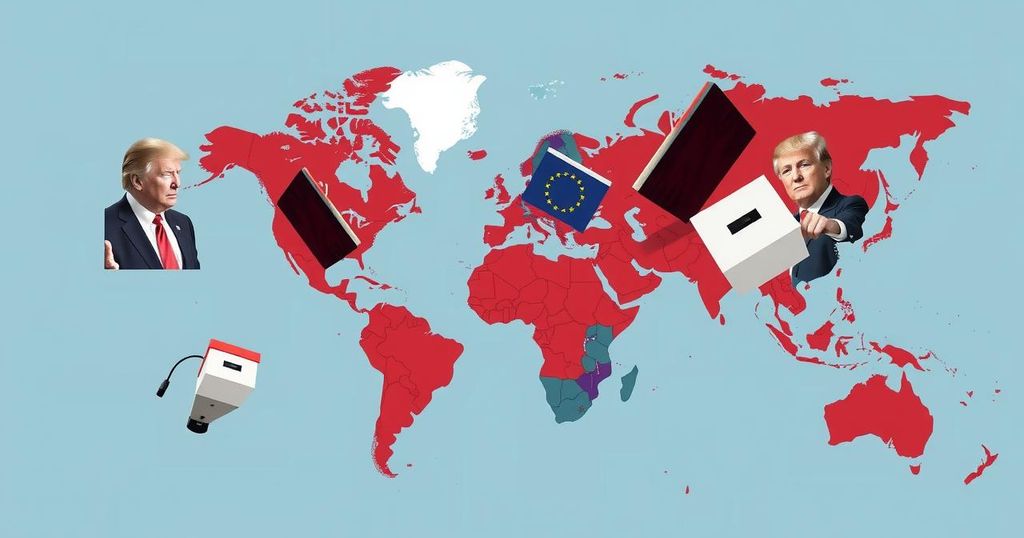World news
AFRICA, AFRICAN NATIONAL CONGRESS, ASIA, BASHA, BASHAR AL - ASSAD, BHARATIYA JANATA PARTY, BRITAIN, CONSERVATIVE PARTY, EUROPE/ASIA, GOVERNANCE, GOVERNMENT, LABOUR PARTY, LIBERAL DEMOCRATIC PARTY, MACKY SALL, MOHAMMAD AL GERGAWI, NA, NORTH AMERICA, OPPOSITION, PARLIAMENTARY SEATS, POLITICS, PRESIDENTIAL ELECTION, RUSSIA, SOUTH AFRICA, UNITED ARAB EMIRATES, UNITED STATES
Stella Nguyen
0 Comments
2024: A Year of Global Political Transformation and the Call for Hopeful Governance
The year 2024 witnessed a dramatic global shift in political leadership, marked by significant anti-incumbent sentiments leading to the removal of various leaders across multiple nations. Political experts urge a transition from crisis management to prioritizing hopeful agendas and direct engagement with constituencies to rebuild trust and empower citizens, emphasizing the importance of economic growth and innovative governance approaches.
In the year 2024, a notable global trend of ant-incumbent sentiments surfaced, leading to the ousting of numerous political leaders worldwide. As articulated by Mohammad Al Gergawi, the Minister of Cabinet Affairs for the United Arab Emirates, governmental roles should center on designing a hopeful future for citizens, a sentiment that leaders must embrace while strategizing for 2025. This period witnessed significant electoral defeats for incumbents, including Senegal’s President Macky Sall and the African National Congress in South Africa, while other leaders faced tumultuous challenges, such as Indian Prime Minister Narendra Modi’s party losing its majority and UK Prime Minister’s Labour Party victory, terminating a lengthy Conservative rule.
The pattern persisted throughout the year with leaders like Japan’s Prime Minister Ishiba Shigeru losing their majority, and Michel Barnier of France being the first Prime Minister ousted via a no-confidence vote in over fifty years. Moreover, Bangladeshi leader Sheikh Hasina’s flight amidst protests and Syrian President Bashar al-Assad’s exodus to Russia underscored the unrest against incumbents. The pivotal question arises—why have incumbents faced such decline? Increased access to social media has contributed by heightening political polarization and eroding trust in governments, facilitating the spread of emotionally charged messages often skewed towards extremism.
Despite the traction gained by far-right populist movements aided by social media, various mainstream parties maintained substantial influence in places like Spain and Ireland, albeit with diminished power. A recurrent theme from this year’s electoral landscape indicates that engagement with the electorate’s concerns via social media is crucial. An instance can be observed in the UK, where government advisors received feedback describing the government as ‘irrelevant’ and ‘untrustworthy’.
To rebuild trust, political leaders must prioritize economic progress and focus on empowering citizens, as evidenced by economic studies correlating conditions such as unemployment with public sentiment toward governance. Countries like Spain and Greece experienced re-election of incumbents, likely due to stable economic growth, unlike Germany, which is facing early elections due to economic contraction.
Furthermore, contemporary leaders are urged to envision a future beyond mere fiscal constraints, drawing inspiration from previous ambitious government projects during times of hardship. Engaging with creative individuals and employing their insights in policy discussions will serve to restore hope among constituents. Citizens expressed a profound desire for a political atmosphere that is ‘realistic’, ‘hopeful’, and ‘empowering’, which reinforces the necessity for governments to evolve and regain their citizens’ trust through meaningful engagement and visionary leadership.
The article examines the significant political shifts occurring globally in 2024, characterized by a widespread anti-incumbent sentiment leading to the removal of numerous political leaders. In various nations, the electorate has expressed dissatisfaction with traditional governance structures, which have become increasingly disconnected from citizenry needs amid rising economic challenges and political unrest. The role of technology, particularly social media, in influencing public opinion and political landscapes is also pivotal to understanding the dynamics at play during this tumultuous electoral year. The article calls for political leaders to embrace innovative approaches that inspire future optimism and engagement with constituents.
In conclusion, the electoral outcomes of 2024 demonstrate a clear trend of voter discontent towards incumbents, driven by social media dynamics and economic challenges. For political leaders to reclaim the trust of their constituents, a shift towards a hopeful, empowering political agenda is essential, coupled with a firm grasp on economic progress. Leaders must prioritize effective engagement with voters and foster a political climate that allows for visionary initiatives, ultimately restoring faith in democratic institutions and governance capacities.
Original Source: www.aspistrategist.org.au




Post Comment